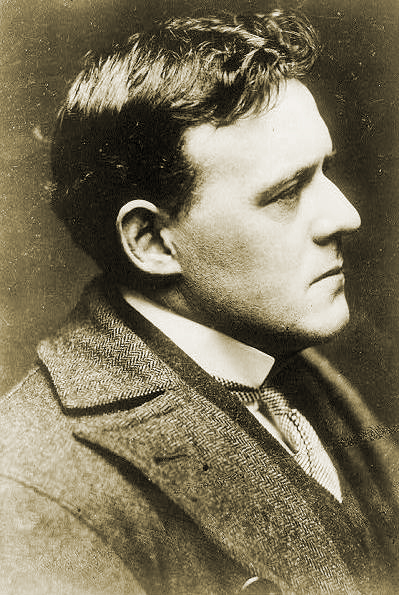The blogger Armor linked the below article by William Pierce in the previous thread but the question remains: How on Earth could whites handed over no less than their culture-creating medium to an alien tribe?
For goodness sake!: Why? I for one blame the latest phase of Western Christian civilization for such treachery (see The Fair Race’s Darkest Hour).
There are so many things worthy of comment today that it’s difficult to make a choice.
Certainly, one of the more significant things is the world’s reaction—or lack of reaction—to the election of Ariel Sharon to be Israel’s prime minister, as soon as he can put together a government. Do you remember the reaction of the mass media, the politicians, the leaders of the Christian churches, and all the rest of the big shots when Jörg Haider’s Freedom Party won enough parliamentary seats in the Austrian elections a little over a year ago to have a role in the Austrian government? Some countries recalled their ambassadors. Politicians around the world were shaking their fingers at Austria and announcing that they would not tolerate Haider’s participation in the Austrian government. Trade embargoes against Austria were threatened. And the reason? Haider had broken some taboos by making statements the Jews didn’t like. He had said that there had been many decent people fighting on the German side during the Second World War, including people in the SS. He had said that some of Hitler’s economic policies in the 1930s had made good sense. And he had called for a cutoff of immigration into Austria.
Now, Haider is not made of very stern stuff, and when he was criticized for his statements, he apologized and back-pedaled. But his apologies had not been enough, and the electoral success of his party resulted in a continuous barrage of sensationalistic media attacks against him and the ostracism of Austria by everyone who stepped to the music of a Jewish drummer.
So now Ariel Sharon is set to become the prime minister of Israel. Sharon is the man who, as Israel’s minister of defense in September 1982, during Israel’s invasion of Lebanon, made the arrangements for the slaughter of more than 3,000 Palestinian women and children in the Sabra and Shatila refugee camps just outside Beirut. The Palestinian fighters had evacuated the camps, leaving their women and children behind, after being assured by the U.S. government of Ronald Reagan that their families would be safe. As the Jews moved in, radio communications among Israeli military commanders were monitored in which they talked about carrying out “purging operations” in the refugee camps. Then the Jews surrounded the camps with their tanks so no one could escape and sent in the butchers. For two days they kept the camps sealed while the slaughter went on. They kept the camps illuminated with flares at night to assist the murder squads. That was Ariel Sharon’s work: more than 3,000 murdered women and children, murdered in a characteristically Jewish way after tricking the men into leaving their families unarmed and defenseless.
But the massacre of refugees in Sabra and Shatila that gave Sharon the nickname “Butcher of Beirut” wasn’t his only work. Long before 1982, when Sharon was an Israeli army general, he was notorious for the atrocities he and his troops committed. He liked nothing better than to sneak into an undefended Jordanian village at night with his soldiers and go on a throat-cutting rampage. After the reaction to his butchery in Sabra and Shatila in 1982, Sharon was obliged to resign as defense minister and leave politics for a while. But when he decided to run for prime minister last year, he prepared the way by deliberately provoking the violence and killing that have been so much in the news in recent months. At a moment when things were already extremely tense, he marched up to Jerusalem’s TempleMount with a large contingent of armed bodyguards who chased away Moslem worshippers and caused outrage among Palestinians. This outrage predictably erupted into stone throwing by Palestinian children and the shooting of Palestinian civilians by Jewish soldiers. Barak couldn’t restore order, and so Sharon beat him in last week’s election and won the chance to become prime minister in his place.
And where is the outrage among the politicians who were wagging their fingers at Jörg Haider a little over a year ago? Where are the sensational media stories about Sharon’s criminal history? Why are the church leaders who condemned Haider’s “immoral” statements now silent? Who is threatening to recall an ambassador from Israel or to cut off trade with Israel?
This is a lesson for those with eyes to see. It is a lesson not so much about Israel’s atrocious behavior but about the hypocrisy and utter dishonesty that characterize virtually all of those outside Israel who occupy positions of power and influence. And it also is a lesson about the nature of our mass media, a lesson about the motivations of the men who control the media. The conventional wisdom is that the media are liberal, that the men who determine their policies are liberals, leftists. But that isn’t so. The truth of the matter is that the media are not liberal: they are Jewish. The men who control them are not liberals: they are Jews. And that is why the media reacted the way they did to Haider’s electoral success in Austria and to Sharon’s success in Israel. Understand? If you believe that you have any other explanation for their behavior, tell me about it.
Well, I could talk all day about this subject—about the absolutely fundamental problem for the whole world that this Jewish control of the media is—but let’s talk about some other things today. There have been lots of new Black-on-White crimes that the media bosses have decided that you don’t need to hear about. An unfortunately high percentage of these crimes have been against young White women. In Little Rock, Arkansas, for example, a serial rapist has raped at least eight White women at gunpoint during the past five weeks. I say “at least eight” because eight victims so far have come forward and given matching descriptions of the Black rapist to police. I have no idea how many other women have been too afraid or too embarrassed to go to the police or simply are unable to give an adequate description. Anyway, we have a Black rapist on the loose in Little Rock who has brutally raped at gunpoint at least eight White women in the last five weeks, and it’s not news outside of Little Rock.
Three months ago, back in November of last year, I told you about the disappearance of Lucie Blackman in Tokyo. Lucie was an exceptionally attractive 21-year-old English girl—a tall, slender, blue-eyed blonde—who went to Japan as a tourist and ended up working as a “hostess” in an exclusive Japanese businessmen’s club. And then she disappeared. In November I told you that although no trace of her had yet been found, Lucie almost certainly had been drugged, raped, and murdered by a Japanese real estate tycoon, Joji Obara, with whom she had been seen leaving the club. Obara liked tall, blonde girls and already had raped a number of them and gotten away with it. Well, now Lucie has been found. That is, her head, her torso, and her hands have been found embedded in a concrete block a little over 200 yards from Obara’s waterfront luxury apartment. It’s big news in Japan, but I’ll bet you hadn’t heard about it. I mean, what a story! Tall, beautiful English girl, wealthy father, predatory Japanese rapist who is a business tycoon, girl’s dismembered body discovered in concrete block near tycoon’s apartment, and it isn’t news in America!
Listen, this is another subject I could spend all day talking about. I have detailed reports on my desk right now of half a dozen other cases of White women raped or murdered or both by Blacks here in the United States in the past few weeks, and the news has been covered up except in the immediate areas where the crimes took place. I believe that it’s worthwhile continuing to talk about these crimes even after I’ve made my point because there always are new listeners who need to be convinced.
After I reported on the mass rape and murder of Whites in Wichita, Kansas, by two Blacks a few weeks ago, I had a number of new listeners write to tell me that they hadn’t believed me when they heard my broadcast, so they had checked it out themselves and were astounded to find out that it was true. They hadn’t thought it possible that anything so horrendous could be or would be covered up. They hadn’t believed that any responsible person—the news director for any national news medium, for example—would want to cover up such a thing. I believe that every time I talk about something like the Wichita massacre I help a few more people discover just how serious a problem we’re facing.
And certainly it’s a serious problem when the people who control the national media deliberately distort the news, suppressing some news and exaggerating other news, in order to mislead public opinion. That is a serious problem. But I’m afraid that often I am guilty of not probing the nature of the problem deeply enough. I’ll give you an example. Members of my organization, the National Alliance, have been distributing some of our publications in Little Rock recently, calling attention to the rising incidence of Black crime against White people. This is a bit of a sensitive issue in Little Rock at the moment because of the series of Black-on-White rapes there I mentioned a minute ago, and while the consciousness of the White citizens of Little Rock is up a bit, we are seizing the opportunity to provide some information to them to which they otherwise might not be as receptive.
Well, the unfortunate fact of the matter is that a majority of the White citizens of Little Rock—and every other city in the United States—are not receptive to any information or idea that is Politically Incorrect, no matter how atrocious the situation. They will cling to Political Correctness like a drowning man clings to a life preserver. They will think what they are told to think and say what they are told to say by Authority. They are lemmings.
After one of our distributions in Little Rock a couple of days ago I received a letter from a lemming there. He began his letter:
Get out of Little Rock! The last thing this city needs is a bunch of ignorant, shortsighted, ill-bred bigots tainting the rest of us with hate. I was disgusted when I saw hundreds of your organization’s pamphlets littering the driveways of normal, decent people here. Et cetera.
He went on to tell me in a prissy, self-righteous way that he is a White conservative who always votes Republican. He also said, however:
Give up your dream of a White nation. It is not going to happen, and it shouldn’t. The world is a diverse place, and it is the better for it.
That, of course, is the party line of both the Democrats and the Republicans, with perhaps a barely detectable difference in emphasis. “Diversity is good. More diversity is better” is the Politically Correct party line. The lemmings believe it because they have heard it directly from their TV. Their favorite sports stars and Hollywood celebrities say the same thing. Al Gore and George Bush say that they believe it, and, by golly, so does every lemming. And the lemmings never heard either Al Gore or George Bush say a bad word about Black rapists who prey on White women. Their TV never has told them anything about Black rapists.
Undoubtedly they are against rape—at least, the respectable, Republican lemmings are. Presumably, the lemmings who have voted for Bill Clinton in the past can’t be very much against rape. But even the Republican lemmings will suddenly have very mixed feelings when the racial aspect of rape is raised. They know that it’s okay for them to be against rape. But it’s not okay to talk about or even think about Blacks raping White women. That hints of not being sufficiently enthusiastic about the wonderful diversity that has been growing like a rapidly metastasizing cancer in our society for the past 40 years or so. The Correct party line is that diversity is all good; there must be no reservations about that: nothing that questions the goodness of diversity.
I mean, just imagine where talking or even thinking about Blacks raping White women might lead. One might think back to a time where Blacks raping White women was virtually unheard of, because, for one thing, Blacks weren’t permitted to hang around White neighborhoods, and for another thing, for a Black to lay a hand on a White woman meant certain death. One might then begin thinking about how and why such a big change has come about over the past 40 years. One might begin thinking about the relationship between the increase in diversity and the increase in the incidence of Blacks raping White women. Oooh! Very Incorrect thinking!
It’s easy to see why the Republican lemming who wrote to me from Little Rock is upset. He is afraid that if I and other National Alliance members talk about the racial aspects of rape in Little Rock it will, to use his words, “taint the rest of us with hate.” Which is to say, that if National Alliance members in Little Rock make a big enough fuss about Blacks raping White women there, and people in Little Rock start thinking about it and talking about it, people in other parts of the country may suspect that the folks in Little Rock are “tainted with hate.” They will suspect that the Republican lemmings of Little Rock aren’t sufficiently enthusiastic about increasing diversity there. I believe that, unfortunately, the Republican lemming who wrote to me is more concerned about that than he is about stopping the rape of White women by Blacks.
Ten years ago I used to think that the way to straighten out the thinking of Republican lemmings was to hit them up alongside the head with a piece of two-by-four or with a sturdy, oak table leg. Then as I learned more about lemmings I realized that wasn’t really necessary. Trauma and privation certainly aren’t bad things when people need to be reoriented, but what is far more effective is simply to change their authority figures. Lemmings don’t need to have their thinking straightened out with a piece of two-by-four, because in a very important sense of the word they don’t think.
The Republican lemming who wrote to me didn’t look at the evidence, think about it, and then come to the conclusion all by himself that more diversity is better. That’s what his TV told him, and he’s just parroting it back. Lemmings no more think about what they’re saying than talking parrots do. That doesn’t necessarily mean that they’re stupid. This Little Rock Republican may be able to program his own VCR and figure out his income taxes all by himself, but when it comes to the question of Political Correctness, he does not think. It’s a conditioned reflex.
I’ve talked with you before about this lemming phenomenon, but it’s an extremely important idea, and it leads to some very important practical conclusions, so I want now to run quickly through the idea once again. First, in the struggle for racial survival in which we are now engaged perception is extremely important. It is essential for people to believe that our struggle can be won. Many people who should be working with me or actively supporting me look at all of the people parroting back what they hear on TV, and they compare that 96 or 97 or 98 per cent of the White population with the very small number of people who are willing to speak out against Sumner Redstone’s plan for a more diverse America, and they are discouraged. They conclude that it’s hopeless, that the odds against us are too great, that the forces of lemminghood are too strong. And so they give up. They won’t fight back.
But you know, that’s the wrong way to look at the struggle. It’s not us versus the lemmings. It’s us versus the people who tell the lemmings what to think. And that’s a very important distinction. I’m reminded of something I saw as a small boy. It’s the scene in The Wizard of Oz when Dorothy and her friends discover that the seemingly all-powerful wizard is not so powerful after all without his illusions and special effects. The Jews are primarily illusionists. They work behind their television screen to create the illusion that everyone agrees with their poisonous ideas and is happy with the way Jews are pushing things: the illusion, for example, that every “normal, decent” person is happy with the trend toward more and more “diversity.” But pull the plug on their television, so that the illusions no longer appear on their screen, and one finds them not so formidable a force after all. And the lemmings, without being told what to think, can only mill around in confusion.
Which is not to say that the lemmings in their mindless millions are not dangerous and can be ignored. The point is that we don’t have to convert the lemmings. We don’t have to persuade them. We just need to whip the illusion-masters. Then the lemmings can be turned 180 degrees in a matter of weeks. The same lemmings who now call for more diversity—and really believe what they are saying—will be calling for racial cleansing and a homogeneous White America—and really will believe what they will say, when the mass media have been taken away from the Jews and returned to the control of our own people.
And that is why I emphasize over and over on these broadcasts the importance of being able to communicate with our people, the importance of breaking the Jewish monopoly control on the dissemination of information and ideas and images and illusions. The key to the survival of our people—the key to returning our people to moral and spiritual and racial health, the key to salvaging what is left of our civilization and our culture and restoring them to health and progress—is, first, to be able to compete effectively with the Jews in communicating with the non-lemming two or three or four per cent of the population able to think for themselves; and then to smash the Jews’ grip on the media with which they control the thinking of the lemmings.
That certainly is not an easy task—but it’s a much more feasible task than trying to make the lemmings think for themselves, and it is more feasible than trying to convert the lemmings while the Jews are still in control of their machinery of illusion. So what we do now is continue to build our own media—continue to gain more listeners every week to these broadcasts; continue to build our ability to disseminate leaflets wherever they may reach anyone with an open mind; continue to make books and other printed material and audio material and video material available to people seeking the truth—and to do this faster than the Jews can move forward with their efforts to ban the First and Second Amendments, thereby outlawing their competition and assuring the perpetuation of their monopoly control of the minds of the lemmings.
We’ll talk more about this in later broadcasts, because it is by far the most important task for the survival of our people.
________________________
Originally a broadcast, “Sharon, Rape, and the Wizard of Oz” was eventually published in Free Speech – February 2001 – Volume VII, Number 2.
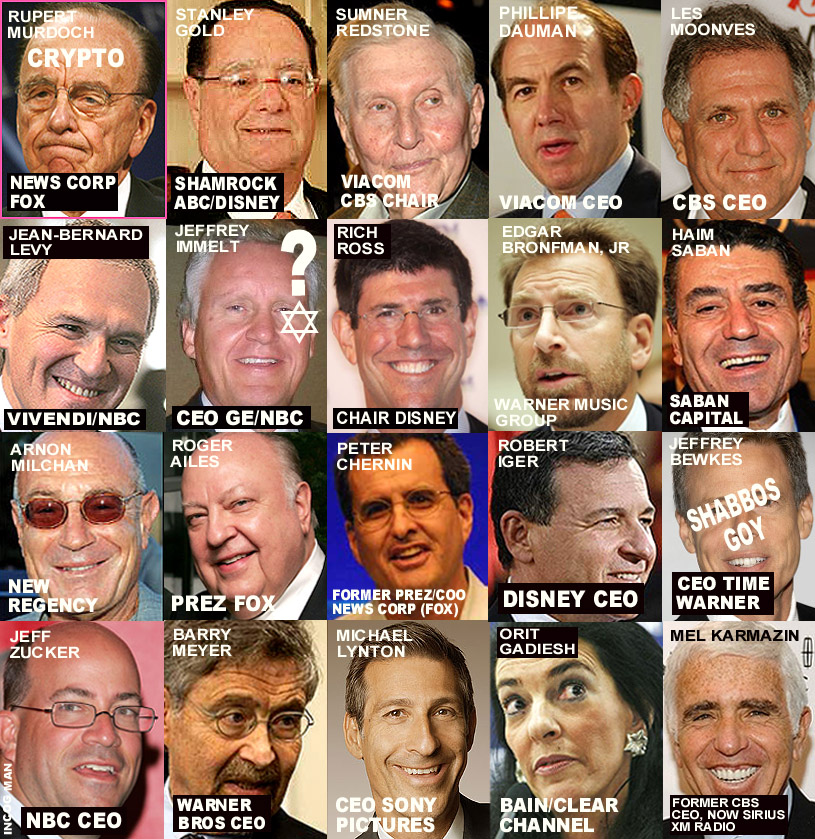
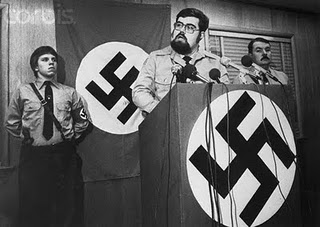

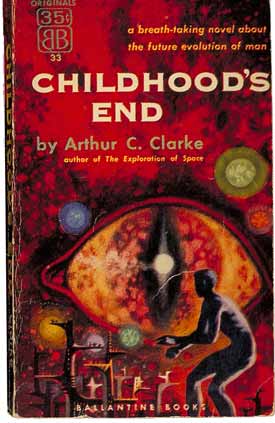
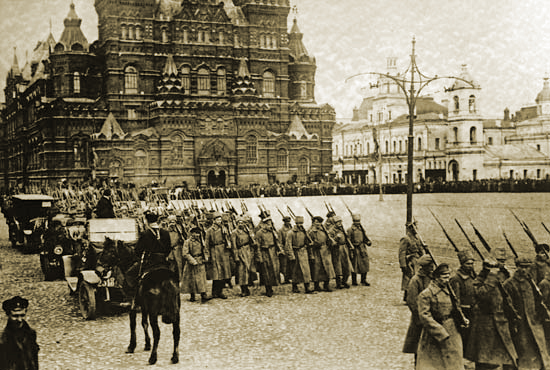
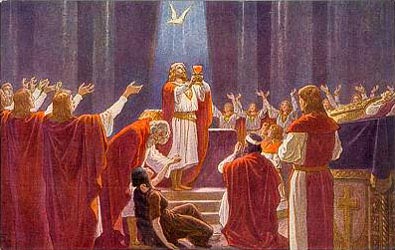
 I guess it’s also a form of mental escapism and suppression of uncomfortable truths and traumatic historic memories. Feeling victimized isn’t a good feeling. That might be another reason why the official narrative is so successful and why there’s a total disconnect with our past and people even identify with the Allied occupants, thus all this talk about “liberation” or Germans watching Tarantino’s movies like Inglorious Basterds and cheering while Germans get slaughtered on screen.
I guess it’s also a form of mental escapism and suppression of uncomfortable truths and traumatic historic memories. Feeling victimized isn’t a good feeling. That might be another reason why the official narrative is so successful and why there’s a total disconnect with our past and people even identify with the Allied occupants, thus all this talk about “liberation” or Germans watching Tarantino’s movies like Inglorious Basterds and cheering while Germans get slaughtered on screen.